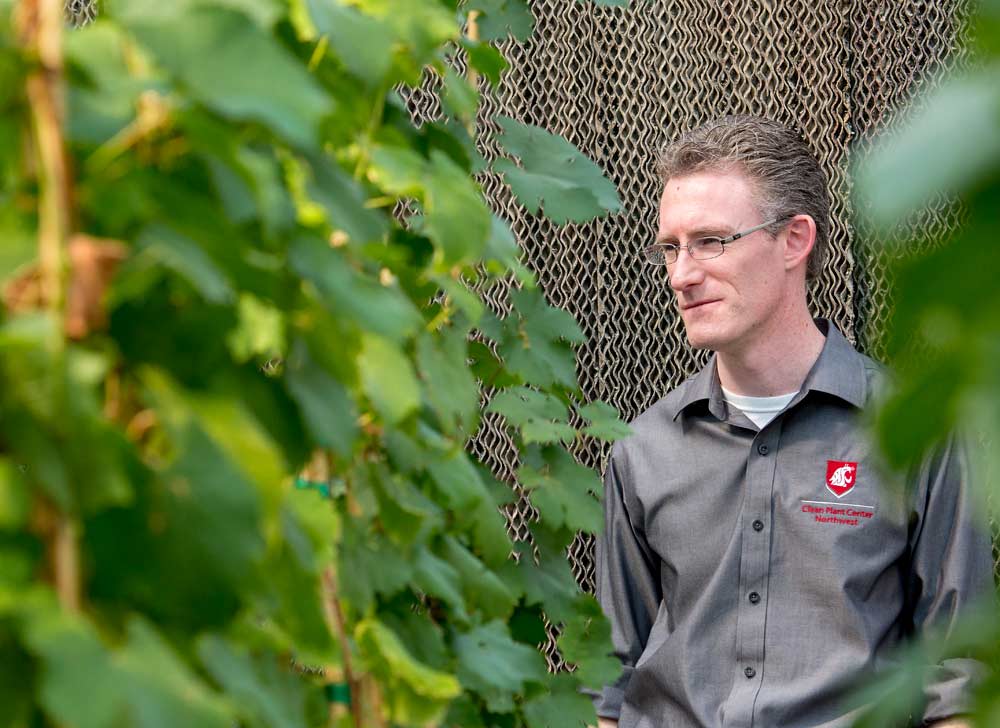
Clean Plant Center Northwest director Scott Harper is surrounded by fruit trees at the Prosser, Washington, center in August 2017. (TJ Mullinax/Good Fruit Grower)
Last year, the leading provider of certified clean budwood for the tree fruit industry quietly put much of its export program on hold, citing the growing burden of meeting diverse international phytosanitary requirements and the need to focus on internal reorganization.
The Clean Plant Center Northwest announced that decision early in 2018. At the time, the organization said it needed to concentrate on meeting the primary mission of the National Clean Plant Network — to provide clean plant material to protect U.S. specialty crop producers. Funding issues and a need to improve record-keeping systems prompted the decision to scale back exports, center director Scott Harper told the Good Fruit Grower.
The center continues to ship to the U.S., Canada and “long-standing customers in select countries for which all phytosanitary requirements can be completed by the CPCNW in-house,” according to an announcement on their website in August. It’s unclear how many of its international customers are covered by that category and how many have been impacted by the restriction.
Around the same time, New Zealand regulators quarantined nearly 50,000 apple and stone fruit trees that had already been delivered to nurseries, citing incomplete records necessary to confirm sanitary status. The discrepancy was found during a visit to the CPCNW.
About 20,000 WA 38 apple trees have now been cleared by New Zealand’s Ministry for Primary Industries, which oversees biosecurity. MPI said in September that about 20,000 stone fruit trees remain in quarantine, awaiting spring assessment for disease symptoms, and about 1,000 apple trees and 6,000 stone fruit trees were voluntarily destroyed by more than a dozen owners.
But MPI also suspended the center’s accreditation, which could limit future access to budwood for New Zealand growers. Harper said the center disagreed with some of MPI’s findings, but re-accreditation is not a top priority. “We will reopen the question of accreditation with MPI once we are satisfied that our core mission in being fulfilled,” he said in an email interview.
That core mission requires restructuring and rebuilding data collection systems that are critical to managing the center’s ever-growing living library.
“Shortly after I began my tenure as director of the CPCNW in January 2017, I discovered a number of substantive record-keeping anomalies,” Harper said. He purchased a new information management system, restructured record keeping policies, and began to retrain staff. That work has taken precedence over exports, he said.
That decision to scale back exports came as a surprise to many in the industry, said Lynnell Brandt, president of Proprietary Variety Management, which manages WA 38. He also serves as the president of the Associated International Group of Nurseries.
“This program is critically important to the industry, especially as the industry is shifting to proprietary materials, and they need to have access to those materials in a way that is clean and safe for usage,” Brandt said. Managed varieties are often international in nature, so he sees the center’s role both in ensuring clean imports and distributing clean exports as equally critical. “We can’t have a one-way situation.”
In a way, the over-extended situation that the CPCNW now faces is a result of its success, as the center was long recognized internationally as a premiere provider of clean plants, Brandt said. That meant materials always came through Prosser, Washington. It would be a detriment to Washington’s industry if the clean plant hub, so to speak, moves elsewhere.
“I know Prosser is quickly working to get caught up,” Brandt said. “In the meantime, I think there needs to be additional conversations around the functions of the clean plant program, and the industry needs to be involved in those discussions.”
The pullback from exports is temporary, Harper said, except for countries that have enacted requirements for testing pathogens or diseases above and beyond the center’s standard diagnostic procedures and abilities. •
—by Kate Prengaman






Leave A Comment